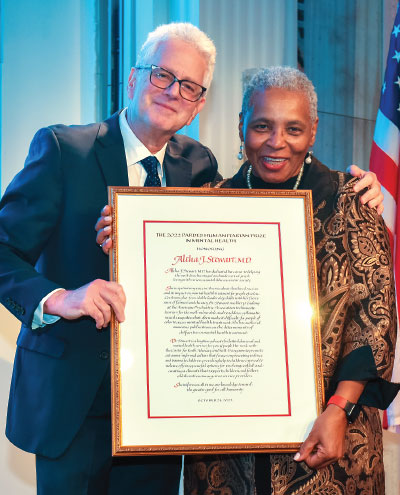Altha Stewart, M.D., Honored With Pardes Humanitarian Prize
Abstract
Stewart, a passionate leader in public psychiatry, was recognized for her tireless efforts to improve mental health services in underserved communities and bring attention to structural racism in health care.
Altha Stewart, M.D., admits she is never at a loss for words. But recently, the APA past president received an unexpected call from Herbert Pardes, M.D., president of the Brain & Behavior Research Foundation’s (BBRF) Scientific Council and a fellow APA past president.

Jeffrey Borenstein, M.D., presents the 2022 Pardes Humanitarian Prize to Altha Stewart, M.D., during BBRF’s International Awards Dinner.
“He eventually got around to saying that BBRF was awarding me the Pardes Humanitarian Prize in Mental Health,” she said. “I paused, and then said, ‘Herb, you’ve done the impossible; I’m speechless.’”
Now that time has passed, Stewart, a senior associate dean for community health engagement and associate professor of psychiatry at the University of Tennessee Health Science Center (UTHSC), can better express her deep gratitude for the honor.
“I am truly honored and humbled to receive this award,” Stewart told Psychiatric News.
The award was presented by Jeffrey Borenstein, M.D., president and CEO of the Brain and Behavior Foundation. He is also editor-in-chief of Psychiatric News.
The Pardes Humanitarian Prize, awarded annually by BBRF, recognizes an individual or organization whose work has made a profound and lasting impact by improving the lives of people suffering from mental illness and by advancing the understanding of mental health.
Stewart noted that she has known of Pardes’ humanitarian work since she was a medical trainee. She later had the opportunity to work alongside him after she was appointed deputy commissioner of the New York State Office of Mental Health in 1991.
“It was wonderful that he continued to be interested in my work after I left New York and offered support and mentorship from afar,” she continued.
As noted in the BBRF awards announcement, Stewart’s career—which has included stints managing public mental health agencies in Philadelphia, New York, Detroit, and Memphis—has been dedicated to “helping the most disadvantaged and underserved people in our society who are living with serious mental illnesses.” Among her many efforts toward that goal, Stewart is the founder and director of UTHSC’s Center for Youth Advocacy and Well-Being, which seeks to improve health care services for children in underserved communities who are exposed to trauma and violence.
BBRF 2022 Outstanding Achievement Prizes in Mental Health
Lieber Prize for Outstanding Achievement in Schizophrenia Research Robert Schwarcz, Ph.D., University of Maryland School of Medicine.
Maltz Prize for Innovative & Promising Schizophrenia Research Sophie Erhardt, Ph.D., Karolinska Institutet.
Colvin Prize for Outstanding Achievement in Mood Disorders Research J. John Mann, M.D., Columbia University and New York State Psychiatric Institute.
Ruane Prize for Outstanding Achievement in Child & Adolescent Psychiatric Research Boris Birmaher, M.D., University of Pittsburgh Medical Center and Western Psychiatric Institute.
Goldman-Rakic Prize for Outstanding Achievement in Cognitive Neuroscience Peter L. Strick, Ph.D., University of Pittsburgh School of Medicine
The UTHSC center is an outgrowth of a project Stewart led for Tennessee’s Shelby County after she returned to her hometown of Memphis in 2003 to help keep children with mental illness out of the juvenile justice system by properly addressing childhood trauma. That project was just one of several efforts by Stewart to address the enduring impacts of racism on the mental health of people of color. During her year as APA president (2018-2019), Stewart made mental health equity one of her core platforms and led initiatives to increase diversity and inclusion in the psychiatric field.
She told Psychiatric News that at the start of her presidency at APA she requested the organization retrieve a portrait of Dr. Solomon Carter Fuller from APA’s warehouse so it could hang in the office at APA’s headquarters reserved for the APA president. “I saw it as a tangible way for the first Black president of the APA to connect with the first Black psychiatrist,” she said. “It was also a reminder that the struggles he had in medicine remain a struggle today.”
Fittingly perhaps, Stewart would go on to receive APA’s Solomon Carter Fuller Award in 2021; this award honors a Black citizen who has pioneered in an area that has significantly improved the quality of life for Black people. Along with the Pardes Prize, she cites the Solomon Carter Fuller Award as one of the proudest moments of her career.
At BBRF’s annual research symposium and awards dinner, Stewart spoke about the need for organizations such as BBRF and federal funding agencies to champion more studies in health disparities. “We need to create an [environment] that values disparities research as part of the progression in academia and professional leadership,” she said. Such efforts will attract additional passionate young scientists who will produce more robust disparities data to make the case for systemic policy changes, she continued.
In a happy coincidence, this year’s event to recognize all the humanitarian and scientific research prize recipients (see box) took place on Stewart’s birthday. “I have family and friends in the area, and I can’t think of a better gift than getting together and sharing this award with them.”
Stewart shared the 2022 Pardes Humanitarian Prize with Robert van Voren, a professor of Soviet and post-Soviet studies at Ilia State University in Tbilisi, Georgia, and Vytautas Magnus University in Kaunas, Lithuania. Van Voren is a longtime human rights activist who has worked on psychiatry reform in the former Soviet Union. Most recently, he helped organize mental health services and supplies for people impacted by the war in Ukraine.
BBRF also awarded two honorary Pardes Prizes in 2022: One went to Clubhouse International, an organization that promotes recovery from serious mental illness (SMI) by creating safe and welcoming environments (clubhouses) where people with SMI can work and socialize together. The other went to Sean Mayberry, the CEO of StrongMinds, an organization committed to providing free interpersonal psychotherapy to women and teens in Uganda and Zambia. ■



